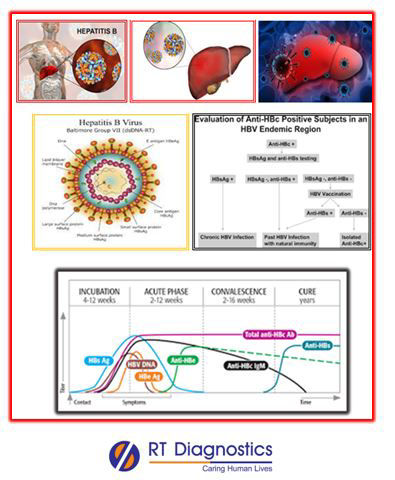ANTI-HBC ANTIBODY:IgG
Why Anti-HBC IgG antibody test?
CLINICAL INFORMATION :
A positive/ reactive ANTI-HBC IgG ANTIBODY TEST is generally indicated as a chronic infection. Hepatitis-B is an infectious disease caused by the hepatitis-B virus that affects the liver (acute or chronic). Other tests include liver function tests and liver enzymes to measure potential liver damage (liver inflammation) caused by a hepatitis-B virus. During hepatitis B virus infection, antibodies such as IgM and IgG since being the body’s first defenses produced against the core virus followed by surface antigens. Antibodies (such as HBsAg-IgG and HBcAg-IgG) are raised against the viral core antigens (HBc) then followed by viral surface antigens (HBs). In a recent exposure to hepatitis-B viral infection in a detectable “window-period” anti-HBcremains as the only serological marker since the levels of antibodies against surface antigens, HBsAg gradually disappears in time. Hence positive result indicates acute (IgM), chronic (IgG) or past or resolves hepatitis-B. Mode of viral transmission is by exposure to infectious blood or body fluids example Childbirth (vertical transmission from mother to child), IV drug users (contaminated needles), sexual intercourse (use of condoms has significantly reduced the spread of sexually transmitted disease including hepatitis among sex workers to others), blood transfusion (blood tests before transfusion has significantly reduced its incidence of spread), dialysis, tattooing (reuse of contaminated needles) and acupuncture (however sterilization and disposable needles have reduced the rate) are a few most frequent modes of infection. Since the incubation period varies from 30 to 60 days the signs and symptoms of hepatitis infection may appear early or delay (up to 180 days). They are as follows - rapid onset of sickness with vomiting, yellow discoloration of the skin, tiredness, dark urine, and abdominal pain. Complications of hepatitis infection can lead to HBV-associated nephropathy, serum sickness-like syndrome, acute necrotizing vasulitis (polyarteritisnodosa), membranous glomerulonephritis (MGN), fulminant hepatic failure (hepatic encephalopathy), cirrhosis, liver cancer like hepatocellular carcinoma, aplastic anemia, cryoglobulinemia, and death. Other tests include liver function tests and enzyme assays such as alanine amino-transferase (ALT) elevated during inflammation of the liver, PCR to measure HBV –DNA, fibroscan for transient elastography, and aspartate aminotransferase (AST) to platelet ratio for the assessment of liver cirrhosis.

General instructions:
Sample Requirement: Specimen - Blood sample taken from the vein. Test Preparation: None.
NOTE - Sample for specimen collections may vary based on the patient’s condition/cases according to the patient’s presentingcomplaints / signs or symptoms:
SPECIMENREQUIREMENT (Special or Rare Cases) - As instructed and guided by Physician / Clinician / Pathologist / as per Laboratory’s requirements, according to procedures and protocols.
This Multi-Specialty Clinical Referral Laboratory RTDIAGNOSTICS provides precise and accurate tests with an extensive range of testing services to the medical centers to help in the diagnosis and identification of pathology in the test specimens for infectious diseases and also to evaluate the function of organ systems of the patient. It prevents further complications and helps to stabilize and restore health to near normalcy at the earliest without delay.



